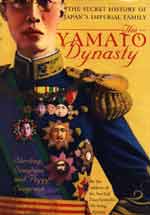GOLDSEA | ASIAN BOOKVIEW | NONFICTION
The Yamato Dynastyby Sterling Seagrave and Peggy Seagrave
Broadway Books, New York, 1999, 394pp, $27.50
The secret history of Japan's Imperial family from the beginning to modern times.
EXCERPT:
 ust before 10 A.M. on September 27, 1945, a maroon 1930 Rolls-Royce with a canvas-covered top whispered out through the Sakurada Gate of the imperial palace in Tokyo and crossed the bridge over its broad moat, followed by three black Daimlers. Japanese pedestrians knew who it was, turned and bowed deeply. Maroon was a color reserved for the emperor's cars. Emperor Hirohito was on his way to a fateful first meeting with Japan's new shogun, General Douglas MacArthur. Sitting on jump seats in the Rolls facing Hirohito -- by custom no subordinate could share the emperor's seat -- were his most senior adviser, Marquis Kido, and a trusted English-language interpreter. In the Daimlers were other members of Hirohito's inner council. The emperor's personal physician accompanied him wherever he went, but on this occasion he had a particular reason: Hirohito was suffering deep depression made worse by jaundice. Since Japan's surrender the previous month, the emperor had slept badly, and today in particular his hands trembled more than usual.
ust before 10 A.M. on September 27, 1945, a maroon 1930 Rolls-Royce with a canvas-covered top whispered out through the Sakurada Gate of the imperial palace in Tokyo and crossed the bridge over its broad moat, followed by three black Daimlers. Japanese pedestrians knew who it was, turned and bowed deeply. Maroon was a color reserved for the emperor's cars. Emperor Hirohito was on his way to a fateful first meeting with Japan's new shogun, General Douglas MacArthur. Sitting on jump seats in the Rolls facing Hirohito -- by custom no subordinate could share the emperor's seat -- were his most senior adviser, Marquis Kido, and a trusted English-language interpreter. In the Daimlers were other members of Hirohito's inner council. The emperor's personal physician accompanied him wherever he went, but on this occasion he had a particular reason: Hirohito was suffering deep depression made worse by jaundice. Since Japan's surrender the previous month, the emperor had slept badly, and today in particular his hands trembled more than usual.
How different from four years earlier, when he had shaken with rage. Then, in September 1941, three months before Pearl Harbor, the emperor had been given a detailed briefing on the High Command's plans for a surprise attack on the United States Navy base and a coordinated lightning conquest of Southeast Asia. Hirohito had asked the army chief of staff, General Sugiyama, how long it would take. Circumspectly, the general had replied that the conquest of Southeast Asia would take only three months. (It took precisely one week longer than that.) But he did not give an estimate for the subduing of America. Testily, Hirohito pointed out that when the war with China had begun in 1937, General Sugiyama had said it would be over in a month, yet it had dragged on for four years and was far from over in the autumn of 1941. Sugiyama protested that China was vast. This increased Hirohito's anger. "If you call the Chinese hinterland vast, would you not describe the Pacific as even more immense?" The general squirmed with embarassment, and sucked his breath in sharply. Hirohito was calmed only by repeated assurances that a diplomatic settlement with America would get priority after Japan got the upper hand. In this, his minister lied, for both the Imperial Army and Navy by then were committed to total war, with no serious intention of quitting while they were ahead. Only a major last-minute concession from America such as dropping its oil embargo of Japan could have altered events, and everyone knew this was unlikely. A formal declaration of war had been prepared long in advance, with the understanding that, "due to a most unfortunate last-minute delay in the English translation," it would not be delivered in Washington until after the attack on Pearl Harbor had already begun.

ASIAN AIR ISSUES FORUM |
CONTACT US
© 1999-2003 GoldSea
No part of the contents of this site may be reproduced without prior written permission.
